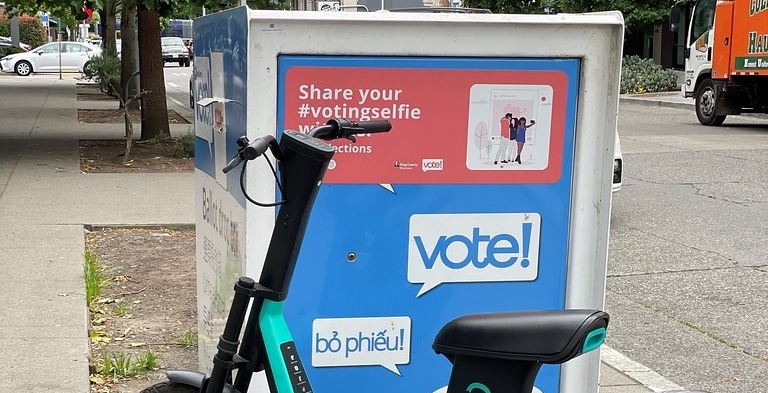Primary elections give voters a chance for change and they accepted that challenge in several races Tuesday. One of the biggest surprises was incumbent Mayor Bruce Harrell’s running behind challenger Kate Wilson of the Transit Riders Union. Will Seattle’s curse of the single-term mayor continue?
Election night counts (only about half the ballots cast) show Harrell at 45 percent to Wilson’s 46 percent or about 1,300 votes short. It’s likely that gap will widen when later ballots, which typically trend left, are counted. Results ensure that incumbent Harrell will be fighting an uphill battle in November.
Equally surprising were outcomes in the contest for Metropolitan King County executive, an open seat since Dow Constantine, the long-time incumbent exec, chose not to seek a fifth term. Comfortably first in the primary was Girmay Zahilay with 40 percent of the votes as opposed to councilmember Claudia Balducci’s second place win at 30 percent. Still with six of the eight primary candidates no longer running, the general election race will inevitably narrow as those votes get redistributed.
One of the biggest upside-down surprises surfaced in the race for Seattle city attorney. Ann Davison, the incumbent, cornered only 37 percent of the vote as opposed to challenger Erika Evans who scored 51 percent. The promising newcomer is a former assistant U. S. attorney who left when Trump took office. She has impressive endorsements including state Attorney General Nick Brown as well as labor and civil rights leaders.
Of the three Seattle City Council seats up for election, Position 9, the at-large seat currently held by council president Sara Nelson, seems most threatened. Challenger Dionne Foster, a city policy advisor, scored 54 percent to Nelson’s 39 percent. The lopsided result signals a scrappy race ahead.
The Position 2 seat, left vacant when incumbent Mark Solomon declined to run, will be a contest between Assistant City Attorney Eddie Lin and Adonis Ducksworth, a city transportation advisor. Lin leads with 46 percent of the vote to Ducksworth’s 31 percent.
Alexis Mercedes Rinck, the incumbent in the at-large Position 8 seat, won 75 of the vote for that position. In November, she will face the second-place winner Rachael Savage who took a modest 15 percent.
Included on the primary ballot were two tax levies, King County Prop 1, funding county parks, trails, and open space; and Seattle Prop 1, renewing the city’s unique Democracy Voucher program. Both were up for a final vote in the primary and both passed. Closest was the voucher program which The Seattle Times editorial board had advised voters to reject. Instead voters gave vouchers 56 percent approval.
Also up for consideration were candidates for Seattle School Board. Two directors, District 4’s Joe Mizrahi and District 5’s Vivian Song, took more than 50 percent in their races; but District 2 candidates, Sarah Clark and Kathleen Smith, are heading into the general election (and a city-wide vote) virtually tied. All the finalists campaigned to avert school closures and to provide more transparent communication.
Final vote totals in the primary will take several days to determine, but voters can be sure that in this year of political discontent, both national and local, there could easily be more surprises to come.
Discover more from Post Alley
Subscribe to get the latest posts sent to your email.

Jean, don’t tell me what I see, tell me why I see it. Give us your opinion. I know you have several theories. You might be wrong but so what: that’s just my opinion. This is what you are good at. I’m all ears.
Also, I have a beer bet on the outcome.
Neil: I would hate to see you lose your “beer bet.” But, forced to guess, I’d conclude Seattle’s primary voters — understandably — are extremely unhappy over national politics and this was a cry for change. Some commentators call it an “F—Trump vote.”
The general election with a bigger turnout could have different results. But after many years in Seattle, I’ve seen voters swing back and forth, each election reacting to the last one.
Probably not everyone in that category relates their sentiment directly to that awful fellow, but they are moved by a vision of what our society is about, etc., that now seems more in question than ever. Same difference.
But in any case it’s hard for Seattle voters to build a robust, representative city hall, when they are so ill informed about local issues and the solutions advocated by special interests. Too many are working at about at the level of children’s cartoons, easily sold on the special interest advocacy. No surprise if this leads to perennial dissatisfaction and alternating wins for each of the black and white cartoon factions.
Thanks for the reply. I value your opinion whether I agree or not. In this instance, I feel that your opinion is correct.
Local reaction to national politics causes local shift to socialism, and then national reaction. As disenfranchisement spreads throughout the city, local, region, it builds momentum. Funny, this same disenfranchisement led to tRumps victory. Opposite sides of same coin.
If this is what is happening, I wonder then, how is this a desirable outcome? Wilson and Mamdani are the popular flavors I suppose. Lots of sugar with promised nutrients.
Is this 2025 or 1917? I am beginning to feel out of touch. Maybe its generational?
BTW. I am rooting and voting for Harrell, but I am betting a beer that Wilson will win in the end.
In my opinion, I’ll win a beer and still lose.